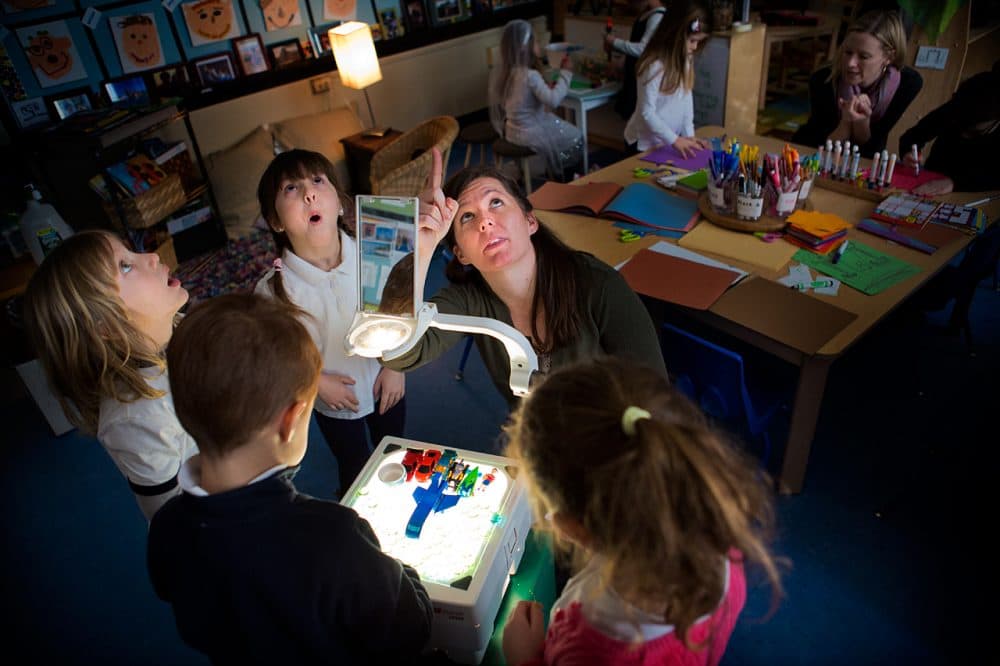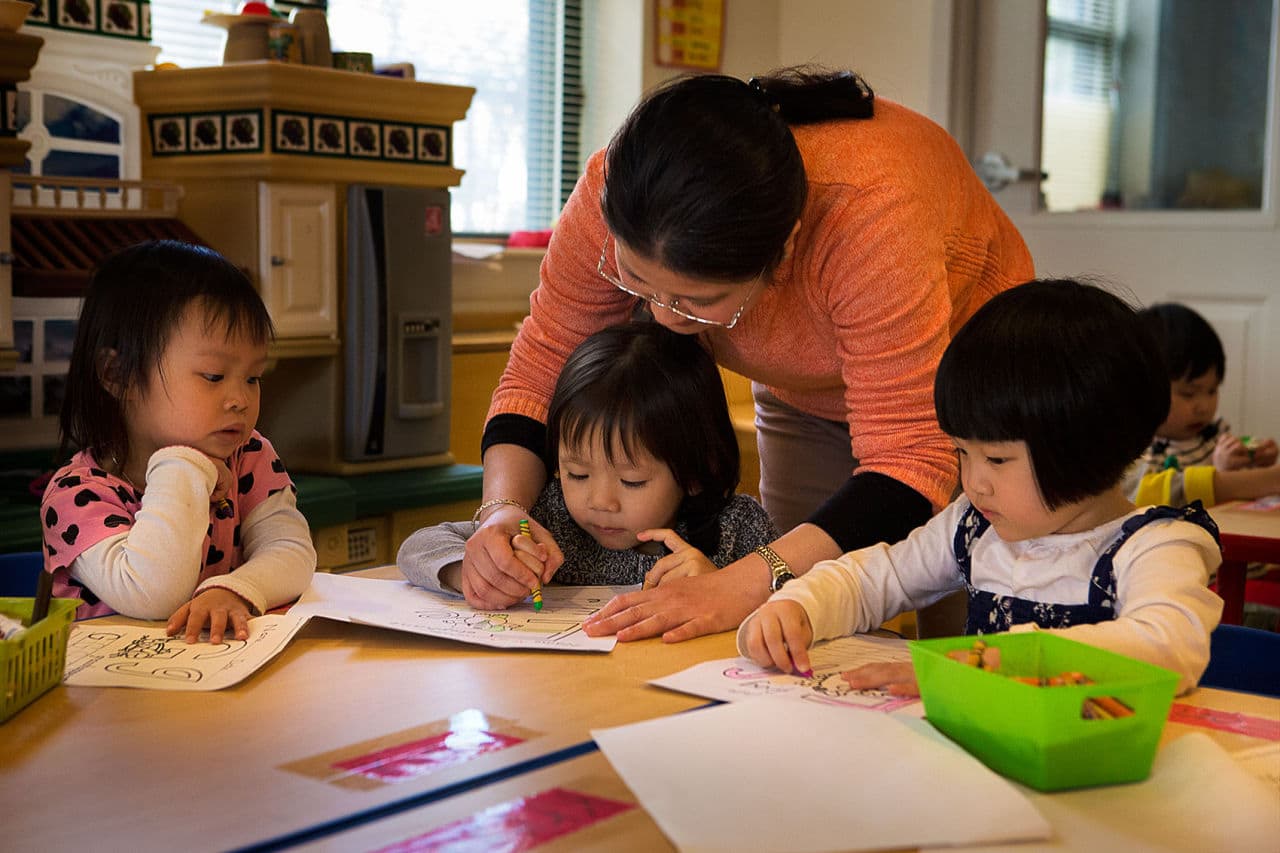Advertisement
Here's What It Would Take To Get Universal Child Care

High cost, low wages, variable quality and limited access: there’s a wicked mess of problems holding back the care and education of young children in America. Massachusetts is no exception.
Last week, as part of her presidential campaign, Sen. Elizabeth Warren announced her plan to cut through the thicket: a big investment in universal child care, free to many families and affordable for the rest.
Many officials and experts have long argued that bringing about quality early learning could pay astronomical dividends in terms of education, the economy, and quality of life in the United States.
But for now, we're not close. And the limited availability of high-quality early care in America is “more than frustrating,” in the words of education expert Elaine Weiss. “It’s kind of crazy.”
The Status Quo
Massachusetts may regard itself as a top education state. But barring Boston’s highly-regarded — and still not universal — pre-kindergarten program, that honorific may not really extend to the state's youngest children.
Here, as in most other states, lots of “early learning” is expensive: at accredited centers, it tends to cost between $14,000 and $21,000 each year.
And even as more and more research reflects the importance of their work, child care employees are paid far less than kindergarten teachers: a median annual income of $26,510. (Part of that cost, some have argued, can be put down to the state's tough regulations.)
And those problems have consequences for the child care marketplace: half of Bay Staters live in areas that have either no or too few licensed operators, according to research on “child-care deserts” from the Center for American Progress, while waitlists for public preschool can be long.
A broad new study being done at Harvard has found that Massachusetts families come up with a diverse variety of solutions to that problem: about a quarter of three- and four-year-olds attend an accredited child care center and about a quarter stay at home with parents or guardians. The others attend a mixture of public preschool, licensed family centers, or are watched by unlicensed relatives and neighbors.
But that diversity of child care strategy shouldn’t be seen to reflect only parental choice, said Stephanie Jones, the lead author of the Harvard study.
Families "are usually in a lottery for a formal setting, or they're trying to put together an arrangement that fits what they can pay,” Jones said.
Advertisement
Jeri Robinson, who sits on the Boston School Committee and who spent her career promoting play-based early education at the Boston Children’s Museum, said to think of the problem in terms of individual households.
For example, even if a child gets into free, accredited public preschool, Robinson said, it’s often the case their school days would still end in the afternoon — and that “grandma can be more flexible.” That’s an especially important consideration for parents who work multiple jobs or long hours.
Jones’ data reflects the fact that young children in Massachusetts' lower-income communities are more likely to spend their first years of learning in an “informal setting,” meaning at home or with a relative.
That isn’t necessarily a bad thing, Robinson said — given the twofold nature of “early education and care” in the official formulation. While centers and preschools may emphasize learning, relatives might easily beat them in terms of providing care.
But Robinson said there are some issues with informal settings, insofar as relatives may not know or be equipped to furnish children with language, reading to them regularly, or keeping them away from too much television.
Meanwhile, at high-priced private preschools, she said, “you have preschool classrooms with teachers who have not only bachelor’s degrees, but master’s degrees. The kids are having early STEM experiences, music classes — way beyond just the basics.”
In Robinson's argument, that can lead to "the achievement gap starting" before kindergarten.

Jones’s research suggests that experiencing the right “learning environment” early can set the stage for surprising and beneficial connections as toddlers age into their school years.
And that may call to mind the famous study found that attendees of a Michigan preschool were — by the time they turned 40 — more likely to be employed and to be paid more, and less likely to have experienced multiple arrests.
What’s Next?
Warren isn’t the first presidential candidate to promise expanded childcare and early education, and that’s with good reason.
Polls show that broad reform — lower costs, high quality, wider access — is extremely popular, and on a bipartisan basis. New York Mayor Bill de Blasio may have won his 2013 election on the strength of his promise to introduce universal pre-kindergarten — in effect, another year of school before kindergarten. And he may be re-elected based mainly on the initiative’s success (if he doesn’t run for president himself).
But the success of de Blasio’s program — which is free to all — depended on a $340 million initial investment out of New York’s state coffers. Mayor Marty Walsh hasn’t yet wrangled the funding to fulfill his own 2013 promise of universal pre-K, and Boston's preschools still don't have guaranteed admission.
In a statement, Kathleen Hart, the spokeswoman for the state's Department of Early Education and Care, said they will continue to provide $545 million next year in subsidies to families and also begin to allocate "funding for communities to expand high-quality preschool opportunities using a public-private partnership model."
State-level pre-kindergarten campaigns often run into resource constraints. But Elaine Weiss said that’s where the Warren plan could enter in.
Since a promise of national, universal child care collapsed during the Nixon administration, she added, “there didn’t seem to be will at the federal level.” Warren, and the current crop of Democratic challengers, could change that.
If there were a massive federal contribution to the program, it wouldn’t simply allow for the expansion and improvement of early learning — what Weiss called a “societal necessity” — she argued it would correct for some of the inequities that exist already.
“We see in K-12 education exactly the problem when the federal government isn’t involved in certain ways,” Weiss said. “We end up with incredibly disparate funding, disparate ability to pay teachers and to provide all the resources that we know make for quality education.”
Weiss said she's aware Warren's plan would take time to develop.
"We need to build up a national cadre of well-trained, qualified childcare providers," she said. "And we haven't done that because we pay them as if they are [garage] attendants or burger-flippers."
There remains some debate about what “quality” pre-kindergarten looks like, and the means to achieve it. Jones said her team at Harvard hopes eventually “to understand the micro-features, the essential elements of [early learning] quality that we could deploy” more broadly. But they aren’t there yet.
And so while she's excited by the Warren plan, Jones said, “Even if you solve the financial problems — no easy thing — you still have the challenge of, how you scale quality across a mixed-delivery system?”
Jones and Robinson agreed that that system — with early learning happening in churches and relatives’ homes as well as school buildings — isn’t going anywhere soon. (Warren’s plan calls for the federal government to partner with local providers to enforce high standards, rather than pivot to a centrally-run, European-style approach.)
Robinson said even if you removed all impediments to one dominant brand of formal childcare, this would still be America.
"We're a culture and a country where everybody wants to make their own choice. You really want people to make informed, good choices," Robinson said. "But the issue is out there — you still have a choice to make."
If you are one of the millions of Americans hoping for a change to the way the youngest children are taught and cared for, stay tuned: there are many more presidential candidates who'll be sharing plans to compete with Warren's, and many more months in which to decide which one works for you.
Correction: An earlier version of this post misstated the dollar amount allocated by the state for child care subsidies . The post has been updated. We regret the error.
This segment aired on March 1, 2019.
